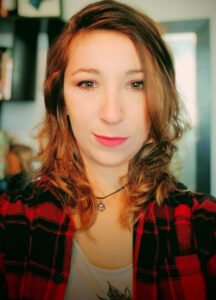
Interview with Maitê Lippel Gothe, Founder and CTO of Carbonic
Bio: She graduated with a Bachelor of Chemistry from the University of São Paulo (2014), with a Science without Borders exchange at the University of York, where she attended the MSc Green Chemistry and Sustainable Industrial Technologies (2012–2013). Ph.D. in Chemistry from the University of São Paulo (2021) in the area of heterogeneous catalysis for the hydrogenation of CO2 to methanol, particularly using rhenium catalysts, at IQ-USP under the guidance of Prof. Pedro Vidinha. She is currently a postdoctoral fellow in the group of Prof. Pedro Vidinha, working on the hydrogenation of CO2 into higher alcohols.
Maitê Gothe, founder and partner of Carbonic, explains that the startup is in a new stage: the implementation of a pilot plant-scale project, which is a scale between laboratory and industrial scale.
“In the beginning, it was a troubled story because in the first project I had to work with many enzymes and I couldn’t make them work, it wasn’t really my area. That’s why I ended up going to heterogeneous catalysis for hydrogenation, which was an area I had more control over, and it ended up working out quite well!”, says the researcher, remembering the beginning.
“The results were good; we realized that we need to build the reactors ourselves. Then comes the famous story of the pan of sand. As the silicone baths could not withstand higher temperatures, we took an old aluminum pan and made our own heating system, and from there came the first results. That’s how we later managed to get the funds to buy an oven and build a better system”, she adds.
The researcher assures that one of the characteristics of the group of scientists at Carbonic is that they themselves create their own facilities. “It takes more work, but also more independence”. In fact, it was because of this resolution capacity that the startup emerged.
“Some time later, when I was about to finish my doctorate, we apply for a patent, something that was not on our radar at the time. We started researching Intellectual Property and Industrial applications; we carried out studies and comparisons; and at the end of the doctorate, there was already a negotiation to increase the scale of the previous results, which is the project we are on now: the scale project of the plant. From then on, the group came up very naturally, with Professor Liane and Professor Vidinha taking the initiative to create the startup”, describes Maitê.
In addition, Carbonic stands out for being one of the most diverse groups at RCGI, with 65% of researchers being women, 35% being foreign (from Colombia and Portugal), and Brazilians coming from Minas Gerais, Santa Catarina, Rio Grande do Norte, and Rio Grande do Sul, representing one of the greatest geographic diversities at RCGI.
“In the beginning, it was just me and Professor Liane, the only women. Then new people started to join. And now with the pilot plant, we feel the need to hire more people who have experiences that add to ours , so we open vacancies for postdocs, and the best resumes were from women”, says Maitê.
In terms of challenges, she says there are many. Who expected the scientific challenges but were surprised by the bureaucratic and logistical challenges. “In this sense, our technician, Maria, who is from Colombia, has been an essential part of the project because she does both the technical part of moving the reactors, helping with the assembly of systems, and the mechanical technical part of high-pressure reactors, pressure, and in the administrative part of purchases, and other bureaucracies”.
What advice would you give to new researchers at the RCGI and researchers in general?
I would give you two pieces of advice: 1) Be flexible, look for solutions, and be resourceful. Don’t give up because you don’t have a ready-made solution; build the solution yourself. 2) Know how to work as a team; collaboration is always crucial.
Finally, we asked asked her to tell us what Carbonic does in the most basic terms possible.”Carbonic turns smoke back into fuel”, she concludes happily when we praise the response. “Yes! It is a good explanation, right?”.
